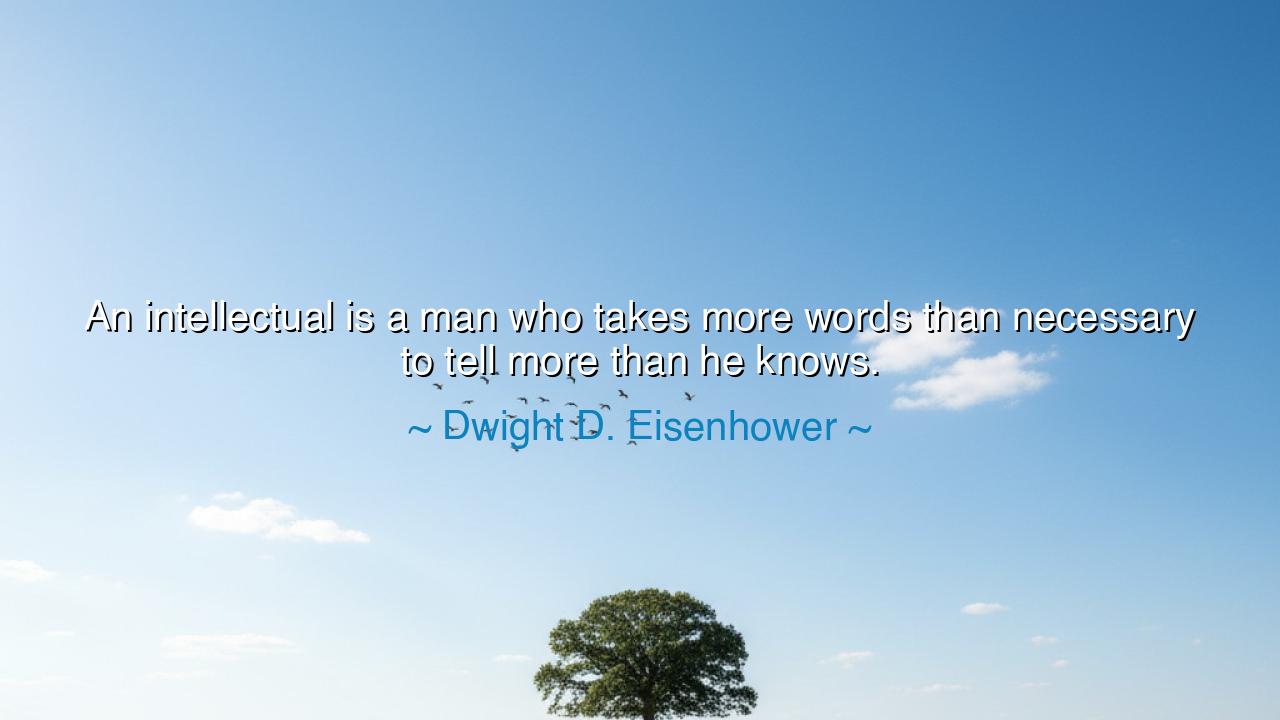
An intellectual is a man who takes more words than necessary to
An intellectual is a man who takes more words than necessary to tell more than he knows.






“An intellectual is a man who takes more words than necessary to tell more than he knows.” Thus spoke Dwight D. Eisenhower, the soldier turned statesman, whose wisdom was born not from libraries but from the battlefield and the burden of leadership. In this wry yet piercing remark, he strikes at a truth that echoes through all ages: that knowledge and wisdom are not the same, and that the one who speaks most is not always the one who understands most deeply. His words carry both humor and warning—for they remind us that intellect without humility breeds confusion, and that the mark of true understanding is clarity, not verbosity.
Eisenhower lived in an era when the world was rebuilt by deeds, not speeches. He had seen empires fall and nations rise, and he understood that words, when not rooted in truth, could become weapons of deceit. The intellectual, in his observation, was not one who possessed true insight, but often one who wrapped ignorance in elegant speech. Such a man, he suggested, uses more words than necessary, not to illuminate but to obscure—to sound wise rather than to be wise. His warning was not against intelligence itself, but against pretension, that most subtle of human vanities: the desire to appear profound instead of being sincere.
The ancients, too, knew this peril well. In the Oracle of Delphi, it was written: “Know thyself.” Yet many learned men throughout history forgot this command, mistaking eloquence for understanding. The philosopher Socrates, humble among thinkers, declared himself the wisest of men only because he knew how little he truly knew. He spoke plainly, questioned deeply, and revealed truth by simplicity. But those who sought to dazzle with rhetoric often trapped themselves in endless argument, using words to veil their ignorance. Thus Eisenhower’s quip stands in the tradition of the wise skeptic—a reminder that the truest minds do not build temples of language around their vanity, but shine through simplicity and honesty.
Consider, for example, the tale of Thales of Miletus, the first of the Greek philosophers. One day, as he gazed upward studying the stars, he fell into a ditch. A servant girl, laughing, remarked, “How can you know what is in the heavens when you cannot see what is at your feet?” In that moment lies the very essence of Eisenhower’s warning. There are those who reach for the clouds of abstraction yet forget the ground of reality beneath them. They mistake speculation for substance. Knowledge divorced from humility becomes folly, and words spoken without understanding become noise.
Eisenhower himself was no enemy of intellect—he was a man of learning and strategy, who planned the great Allied victory of World War II. Yet he valued action over abstraction, and clarity over complexity. He knew that the fate of millions could not depend on theories spun in endless debate, but on decisions made in the crucible of necessity. For him, wisdom was proven not in how much one could say, but in how effectively one could act. He saw, with soldier’s eyes, that the simplest command—“Advance”—was often more powerful than a thousand eloquent speeches.
The lesson he leaves is clear: beware the comfort of words that conceal rather than reveal. True knowledge does not need ornament; it shines by its own light. The wise speak to enlighten; the vain speak to impress. The voice of truth is steady, calm, and brief, but its echoes endure. Let your words be few and your thoughts deep. Speak only when you have seen, and only of what you know. For the tongue that runs faster than the mind becomes the instrument of folly.
And so, my child of reason and reflection, remember this teaching: simplicity is the garment of wisdom. When you speak, speak with purpose; when you write, write with sincerity. Seek not to sound brilliant, but to be clear. The truly wise are not those who drown the world in language, but those who, with few words, awaken understanding. For it is better to be silent and right than to be eloquent and wrong.
In the end, Eisenhower’s saying is not a jest but a mirror—a call to humility in the pursuit of knowledge. Let your intellect be a servant, not a master; your words, a bridge, not a wall. Then you shall not merely appear wise—you shall be wise, and your voice, however quiet, shall carry the weight of truth through the ages.






AAdministratorAdministrator
Welcome, honored guests. Please leave a comment, we will respond soon